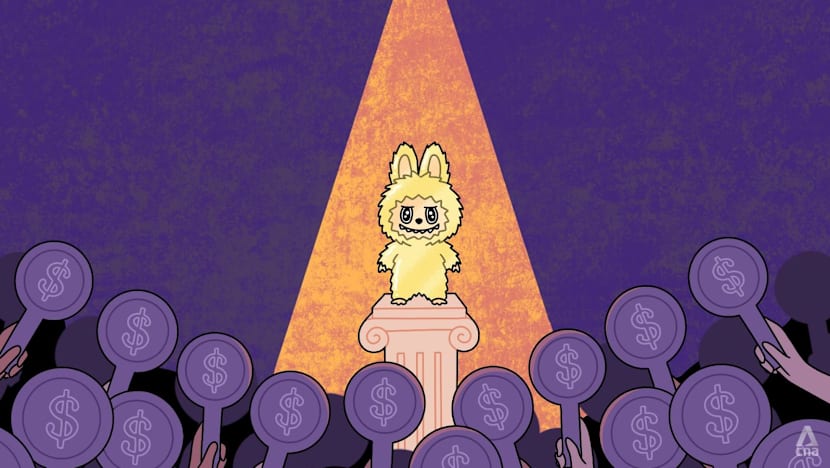Lifestyle
How Labubu’s ‘Ugly-Cute’ Aesthetic Ignited a Global Toy Craze

The collectible toy market has witnessed a remarkable surge in popularity, particularly with the rise of the ‘ugly-cute’ Labubu figure, a creation of the Chinese company Pop Mart. In August 2023, at the Marina Bay Sands Expo and Convention Centre, enthusiasts like Terry Khoo braved early morning hours to secure exclusive editions of Labubu, illustrating a growing global trend that has captivated collectors.
Khoo, a 29-year-old project manager, arrived at the convention by 5:00 AM, only to find himself at the end of a long queue. “I thought it was early, but when I got there, I realized I was way at the back,” he said. Despite waiting for six hours, the launch of the limited-edition Merlion Labubu was ultimately cancelled due to a scuffle among fans. Although he did not acquire the toy, Khoo has since built a collection of around 30 Pop Mart figures, stored in display cabinets at home and in his office.
Alongside Khoo, many collectors have rallied behind the Labubu phenomenon, which has propelled Pop Mart into the spotlight. Another dedicated fan, Ripple Sim, has invested thousands of dollars in her collection, which includes over 100 items featuring popular characters like Labubu and Skullpanda. The 41-year-old event stylist began collecting in August 2023, motivated by the growing hype surrounding Labubu. Sim also shares her passion through live unboxing sessions on social media, engaging with fans and collectors alike.
Blind-box toys, which are sold in sealed packaging, conceal the contents from buyers, adding an element of surprise to each purchase. A civil servant in her mid-30s, who chose to remain anonymous, has amassed over 300 Pop Mart items, spending approximately S$5,000. She expressed that the thrill of the unboxing process is a significant part of her enjoyment.
The demand for Labubu toys has led to astonishing financial success for Pop Mart. In August 2023, the company reported a nearly 400 percent increase in net profit for the first half of the financial year, with revenue soaring by 204.4 percent year-on-year to 13.88 billion yuan (approximately US$1.95 billion). This meteoric rise has sparked intrigue and skepticism about the sustainability of the trend.
Dr. Joicey Wei, an associate professor of marketing at the Singapore University of Social Sciences (SUSS), noted that while the appeal of Labubu may not resonate with everyone, the emotional and collectible value for fans is undeniable. “To many who don’t understand the appeal, spending hundreds on a plastic toy seems like an irrational waste,” she stated. Nonetheless, such sentiments clash with the enthusiasm of collectors who see value in their pursuits.
Pop Mart’s success story began in 2010, but it was the launch of Labubu collectibles in 2019 that truly transformed the brand. Following an exclusive licensing deal with Hong Kong illustrator Lung Kasing, Labubu’s popularity exploded, particularly after Lisa of the K-pop group Blackpink showcased the toys on Instagram in April 2024. Celebrities including Rihanna and Naomi Osaka have also been spotted with Labubu dolls, further fueling the craze.
As of August 2023, Pop Mart operates 571 stores worldwide, up from 80 the previous year, and has introduced automated vending machines—known as “Robo Shops”—across 18 countries. Dr. Brian Lee, head of SUSS’ communication program, believes that despite concerns about market saturation, Pop Mart’s business model is designed for sustainability. He emphasized the importance of maintaining perceived scarcity and consumer excitement.
The appeal of blind-box toys can be attributed to various factors, including the excitement of surprise, social media amplification, and the growing trend of “kidulting,” where adults seek nostalgic items for emotional comfort. Dr. Shilpa Madan from Singapore Management University described Pop Mart’s strategy as a “masterstroke,” blending aesthetics with unpredictability to create community engagement.
Despite the fun and thrill of collecting, opinions on Pop Mart remain divided. Critics argue that the toys lack cultural significance and craftsmanship compared to traditional collectibles like stamps or trading cards. “Non-collectors often view these as just plastic figurines,” noted Isabel Thum, a 27-year-old collector. Yet, for many, the joy derived from the collection and engagement with fellow fans is invaluable.
While Pop Mart’s future may seem bright, analysts warn of potential risks that could challenge the brand’s success. Recent stock declines have raised concerns about the longevity of the Labubu craze. Factors such as increased regulatory scrutiny and the emergence of counterfeit products could pose threats to the brand’s reputation. Furthermore, trends in consumer behavior are ever-changing, and Pop Mart must innovate to maintain interest.
As the market evolves, the company has committed to investing in research and innovation, which will be crucial for sustaining sales momentum. For now, the community around Labubu continues to thrive, with collectors enjoying their passion while the world watches to see how long this unique toy phenomenon can last.
-

 Business5 months ago
Business5 months agoKenvue Dismisses CEO Thibaut Mongon as Strategic Review Advances
-

 Lifestyle4 months ago
Lifestyle4 months agoHumanism Camp Engages 250 Youths in Summer Fest 2025
-

 Sports4 months ago
Sports4 months agoDe Minaur Triumphs at Washington Open After Thrilling Comeback
-

 Sports5 months ago
Sports5 months agoTupou and Daugunu Join First Nations Squad for Lions Clash
-

 Top Stories5 months ago
Top Stories5 months agoColombian Senator Miguel Uribe Shows Signs of Recovery After Attack
-

 World5 months ago
World5 months agoASEAN Gears Up for Historic Joint Meeting of Foreign and Economic Ministers
-

 Health4 months ago
Health4 months agoNew Study Challenges Assumptions About Aging and Inflammation
-

 Business5 months ago
Business5 months agoOil Prices Surge Following New EU Sanctions on Russia
-

 Entertainment4 months ago
Entertainment4 months agoDetaşe-Sabah Violin Ensemble Captivates at Gabala Music Festival
-

 Entertainment4 months ago
Entertainment4 months agoBaku Metro Extends Hours for Justin Timberlake Concert
-

 Top Stories5 months ago
Top Stories5 months agoRethinking Singapore’s F&B Regulations Amid Business Closures
-

 Business5 months ago
Business5 months agoU.S. House Approves Stablecoin Bill, Sends to Trump for Signature









